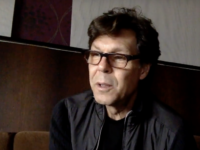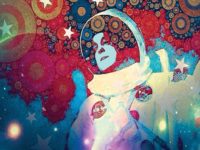As the pandemic begins a glacial retreat, performers, promoters and fans look toward a future in which live music can again become a shared experience.
Todd Rundgren has a different future in mind, and he’s doing it now. The longtime pop star/cult favorite is in the middle of a tour, hop-scotching from Buffalo to Virginia Beach to Pittsburgh to Cleveland to Houston to Seattle and various points in between – all without leaving Chicago.
Though the concept of a virtual show has become almost routine during this time of the novel coronavirus, Rundgren has been warming to the idea for years. He cites the possibility of missing a show because of airline delays, though he’s admitted he never considered the show wouldn’t be able to go on because the fans couldn’t make it.
When he revisited the idea, he still wanted to be able to perform for a specific audience. So he came up with the idea of performing nightly shows for different cities, using technology to enable only fans from that area to purchase tickets. That geofencing concept got scuttled during the run, but the shows are still geared toward individual cities. Even for the performers, who get to partake of Buffalo wings for the Buffalo show or other local delicacies, while the pre-show visuals would showcase Buffalo or Houston or Seattle.
The shows are dubbed the “Clearly Human” tour, and both the band’s configuration and the setlist draw from 1999’s Nearly Human album and era. With longtime compadres Kasim Sulton (bass), Prairie Prince (drums), and Bobby Strickland (woodwinds), Utopia supersub Gill Assayas and a trio of backup singers including his wife Michelle, Todd Rundgren was looking to recapture both the sound and the show.
He does that in spades. Traditional show opener “Real Man” leads seamlessly into “Love of the Common Man,” now featuring sax and muted trumpet. “Unloved Children” features thumping bass and bari sax before Rundgren unleashes Foamy, the seafoam-green Fernandes strat copy he got while on tour in Japan many years ago. As on the Nearly Human and other tours throughout the years, Rundgren hands off much of the guitar work. For these shows, Bruce McDaniel is doing the heavy axe-lifting, his bluesy lines offering contrast to both Rundgren and previous guitarist Jesse Gress.
[SOMETHING ELSE! INTERVIEW: Ross Boissoneau caught up with Todd Rundgren for a discussion on growing as an artist, learning through listening, and shared musical experiences.]
Gress is currently recovering from a lung transplant. He contracted double pneumonia, flu B strain, and sepsis, which led to the incurable condition Idiopathic pulmonary fibrosis. He is still accepting contributions for the procedure and recovery at GoFundMe.
The rowdy and rocking concert favorite “Love In Action” was followed by “Compassion,” from 1981’s Healing album. The contrast was sublime, and the latter featured some of the most beautiful moments of the show.
Then came a new addition of an old favorite: Todd Rundgren said it was the first time the band had attempted “Love Is the Answer,” a minor hit for both Utopia and England Dan & John Ford Coley back in the day. It remains one of Rundgren’s greatest triumphs musically. Here it’s given a more panoramic treatment than the four-piece Utopia could realize. Throughout the show, the three women on backing vocals – Nia Halvorson, Grace Yoo and Michelle Rundgren – were aided and abetted by most of the rest of the band, including Sulton, McDaniel, Strickland, Assayas, trombonist/trumpeter/percussionist Steven Stanley, and second keyboardist Elliot Lewis. Only Prince eschewed from adding vocals.
McDaniel got another chance in the spotlight with “Can’t Stop Running,” one of the standout tracks from Nearly Human. On “Change Myself,” Sulton’s five-string bass laid the foundation. “Can We Still Be Friends” was a gorgeous singalong, and “Lost Horizon” from 1985’s experimental A Cappella album was a treat. The standout member of the band was probably Strickland, effortlessly segueing from bari to tenor to alto sax to a gorgeous flute on “God Said” from 2004’s Liars.
For an encore, a swinging “Hello It’s Me” owed a debt to Rundgren’s sultry interpretation on 1997’s With a Twist, before the show ended with “I Love My Life,” again from Nearly Human.
Yes, it’s still a virtual show. Occasional dropouts could be the fault of the outgoing line or incoming one, but that’s really a small price to pay for being able to enjoy a live show. Knowing that it’s happening as you watch it gives it an immediacy you just don’t feel when watching pre-recorded shows.
As for Todd Rundgren himself? No, his voice isn’t as supple at 72 as it was at 32. Some of the falsettos were strained and nasally, while the low end wasn’t as punchy as it might have been. Early on he was tending a bit flat, but as the show went on things evened out. Truthfully, it would have been nice to hear bigger background vocals, particularly from Kasim Sulton, one of the unique and best voices in rock.
Rundgren told the Chicago Tribune that the concept was both something techy that appealed to his nerdy side and would give his fans something they’d been missing: “I think at this point, doing something artsy — yeah, that might be the more obvious way to go, but just doing something fun I think is maybe more important now, that people have some fun in their lives.”
No doubt he’s right. The tour runs through March 22. Click here for tickets and info.
- Jon Anderson, Reza Khan, CSNY + Others: Ross Boissoneau’s Best of 2024 - December 30, 2024
- Tower of Power, Jennifer Hudson, Ben Folds + Others: 2024’s Seasonal Sounds - November 25, 2024
- Dave Bainbridge of Downes Braide Association: The Albums That Shaped My Career - October 9, 2024




